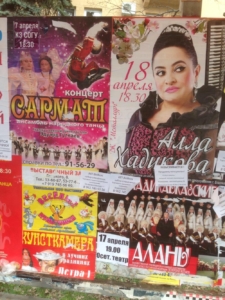South Ossetia follows the path of Israel

Photo: JAMnews, Tamara Agkatseva
On 9 April 2017, in a referendum held simultaneously with the presidential elections, nearly 80 percent of South Ossetian voters supported the country’s renaming to the ‘State of Alania’.
History and modern fashion
Reference, JAMnews
The ‘Alans’ were Iranian-speaking tribes that established a state in the 4th century at the foothills of the Caucasus that existed lasting up until the 13th century.
Those territories were later seized by the Mongols, forcing the Alans to hide in the mountains of the Caucasus.
Today, many historians consider modern Ossetians as the descendants of The Alans, and stress the noticeable Alan influence in the culture of other Caucasian peoples.
North Ossetia was the first to officially name itself Alania and becoming the Republic of North Ossetia-Alania.
The words “Alans” and “Alania” can often be heard in Vladikavkaz.


Mostly seen on advertising posters informing the residents about upcoming concerts of folklore ensembles (in terms of quantity, they are comparable to the offers of micro-earphones stuck on a wall of a university building, assisting in passing exams).
It is also visible on the walls of a local stadium that previously hosted matches of Vladikavkaz’s Alania. Now it’s part of history – in the previous year “Alania” reverted back to its historical name “Spartak”.
But the interest to everything associated with the Alan heritage is sincere.
For example, an elderly artist Oleg, who sells his own and other people’s paintings in the center of Vladikavkaz, will enthusiastically tell you how far the ancestors of the current Ossetians went in their campaigns. According to him, the names of the Russian rivers Don and Donets, as well as the European Danube have Alanian roots.
Young people are also keeping up with the older generation. Young Ossetian intellectuals that have studied in Moscow and Europe, and united in a FB-group, laugh at themselves, saying “… yes, there is something from the Alans in us.” However, they regard the topic of finding historical roots seriously.

Photo: JAMnews, Jana Tarkhanova, Vladikavkaz
First of all, they say that they are concerned with the preservation of their native language, and also because the Ossetian history is not rich in material objects.
The native language of the Ossetians has become the language of the street and home communication over the past few decades. Russian has, meanwhile, become ever more important. Therefore, the current objective is to make the Ossetian language fashionable.
“It requires some adjustments and introduced into daily use, and everything will be fine” they explain in ‘not so clean’ Russian.
The less educated society have a standard attitude towards the idea of Alanism:
Vladislav Kuzaev, resident of Vladikavkaz. JAMnews, Tamara Agkatseva
Lack of Jews
But on the whole, the idea of creating the “State of Alania” on the territory of the South is not really understood in North Ossetia, neither by the youth, the elderly, the intellectuals, or the people who do manual labor.
When asked about the referendum in support of Alania, people with life experience who do not expect anything positive from the initiatives of the government often explain it as a move aimed at attracting money for new passports, stamps, and seals.
Young people become very embarrassed when someone tries to discuss this topic with them – They feel uncomfortable to admit that they know nothing about the subject, ultimately saying something like: “well, actually, now we have term exams, you know”.
“There is only one state in the world,” says the well-known publicist Leonid Kochiev, “whose name doesn’t specify the concept of state structure. That’s Israel. “
I have shared this opinion with the owner of a bookstore (very good one) on Peace Avenue in Vladikavkaz. He was skeptical about it, saying it wouldn’t work out, as we don’t have enough Jews.
Contenders
There are also other contenders in the North Caucasus competing to be regarded as the descendants of the Alans.
 Photo: JAMnews, Tamara Agkatseva
Photo: JAMnews, Tamara Agkatseva
A short distance from Vladikavkaz, just across the border with Ingushetia, there is a newly built Alanian Gate, a project of Beslan Tschoyev, the mayor of Nazran who is a big fan of the Alanian ancestry idea.

Photo: JAMnews, Tamara Agkatseva
A solid brick structure standing in a clear field in the middle of the road. Beautiful, yet somewhat typical – its Alanian features can’t really be determined. If such a gate was installed under Voronezh, it would symbolize a return to Slavic roots, and to the Tatar roots somewhere in Kazan.
There is an alternative view from other Caucasian peoples, Karachais and Balkars, on the issue of Alans and their legacy:
“We are the Alan people and the Alan temples are ours. Deprived of them we will cease to be Alans and lose all our centuries-old heroic history and become “mankurts” i.e. People oblivious of its origin and home”- a quote from the report of the former chairman of the Congress of the Karachai People, Kazbek Chomaev.
A while ago, passions flared up in North Ossetia (staying, however, within the limits of decency) about the “Alan” song performed by Kabardian singer Omar Otarov. The song attempts to prove that Kabardians are the real Alans.
This song received a record number of statuses in the popular Facebook group in North Ossetia called “Magas and Dediakov” (names of two ancient Alan cities). The group is dedicated to a scientific discussion of the topic of Alans, their origin and modern successors.
“The lyrics contain just one verse (out of 20) that doesn’t say the word “Alan”, which is ridiculous. Scientists put so much effort in collecting every indirect mention of the Alans, while the song is simply filled to the brim with the word “Alan”, and zero attention from the academic world”.
“So what’s the song about? Judging by the translation, this is a call of an unknown speaker to his fellow tribesmen to go to war with some unknown “strangers from the sea” that have “black blood”. Who are these awesome people? The Author of the post calls them Adygs. Well, thankfully not the orcs of Sauron.”
“This song about the Alans is sort of an auto-training session: “Alan, Alan, Alan, Alan, Alan, Alan …”. This masterpiece of the song genre has set a record for the frequency of using this word”.
Generally, the topic of the Alanian heritage evokes an ambiguous reaction in North Caucasus societies.
On the one hand, it’s pure interest, an attempt to find an ideological support in one’s own historical roots after the disappearance of the chimeras of the Soviet era.
On the other hand – a very skeptical view as to the way politicians try to benefit from this topic.



















